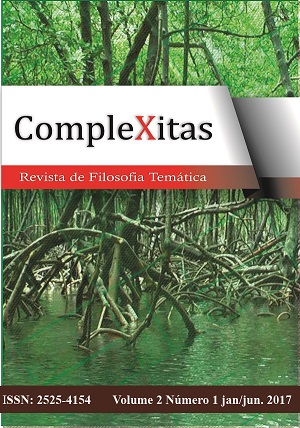Emergence and Self-Organization of Complex Systems: the role of energy flows and information a philosophical approach
DOI:
https://doi.org/10.18542/complexitas.v2i1.5610Palavras-chave:
Complex Systems. Self-organization. Matter. Energy. Information.Resumo
How order emerges from noise? How higher complexity arises from lower complexity? For what reason a certain number of open systems start interacting in a coherent way, producing new structures, building up cohesion and new structural boundaries? To answer these questions we need to precise the concepts we use to describe open and complex systems and the basic driving forces of self-organization. We assume that self-organization processes are related to the flow and throughput of Energy and Matter and the production of system-specific Information. These two processes are intimately linked together: Energy and Material flows are the fundamental carriers of signs, which are processed by the internal structure of the system to produce system-specific structural Information (Is). So far, the present theoretical reflections are focused on the emergence of open systems and on the role of Energy Flows and Information in a self-organizing process. Based on the assumption that Energy, Mass and Information are intrinsically linked together and are fundamental aspects of the Universe, we discuss how they might be related to each other and how they are able to produce the emergence of new structures and systems.Referências
ATKINS P.W. The Second Law. New York: Scientific American Books, 1984.
AYRES, R.U. Information, Entropy and Progress. New York: AIP Press, 1994.
CIRLOT, J. E. A Dictionary of Symbols. London: Routledge & K. Paul, 1971.
COOPER, J. C. An Illustrated Encyclopaedia of Traditional Symbols. New York: Thames & Hudson, 1987.
CRUTCHFIELD, J. P. Is anything ever new? In G. Cowan, D. Pines, and D. Melsner, editors. SFI studies. In: the sciences of complexity XIX.Massachusetts, USA: Addison-Wesley, 1994.
EBELING, W. Modelle der Selbstorganisation in okologischen und ökonomischen Systemen. In F. Beckenbach (Ed.), Die okologische Herausforderung für die ökonomische Theorie. Marburg: Metropolis-Verlag,1991.
FENZL, N.; HOFKIRCHNER,W; Stockinger, G. Information und Selbstorganisation, Studienverlag Insbruck-Wien. Third Conference on the Foundations of Information Science.
Paris: FIS, 2005.
GITT, W. Information gehört zum Wesen des Lebens. Technische Rundschau, n.47, nov. 1989.
GREEN, D. G.. Emergent behaviour in biological systems. In: D. G. Green and T. J. Bossomaier, (Ed.): Complex Systems - From Biology to Computation. Amsterdam: IOS Press, 1993.
KORZYBSKI, S.; HAYAKAWA, I.. “General Semantics”. A Review of General Semantics, v.3, n.1, 1945.
LASZLO, E. Evolution, die neue Synthese. Munique: Europaverlag, 1987.
PEIRCE, C. S. Semiótica e filosofia – textos escolhidos de Charles Sanders Peirce.
São Paulo: Editora Cultrix, 1972.
PRIGOGINE, I.; STENGERS, I. Das Paradox der Zeit, Piper, 1993.
SHANNON, C. E.; WEAVER, E. A mathematical theory of communication, Champaign: University of Illionois Press, 1964.
STONIER,T. Information and the Internal Structure of the Universe. London: Springer, 1990.
STONIER,T. Beyond Information. The natural history of Intelligence. London: Springer, 1992.
WEIZSÄCKER, C.F. Die Einheit der Natur. München: C.Hansen, 1971.
WIENER, N. Cybernetics. New York: John Wiley, 1948.
Downloads
Publicado
Edição
Seção
Licença
Os direitos autorais dos artigos publicados nesta revista são de propriedade dos autores, com direitos de publicação inédita para o periódico.
Permissões de direitos de autor
Ao aceitar a Declaração de Direito Autoral o(s) autor(es) autoriza(m) a Complexitas – Revista de Filosofia Temática a publicar o texto submetido por meio impresso, eletrônico, CDRom, internet ou outro meio conhecido.


